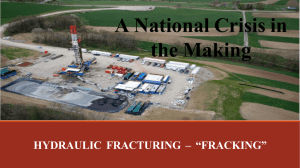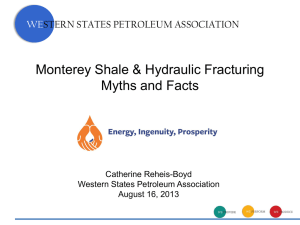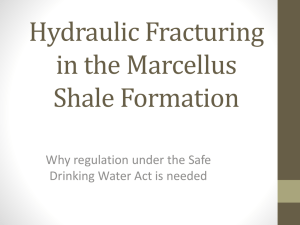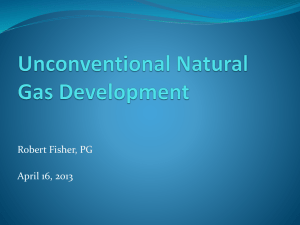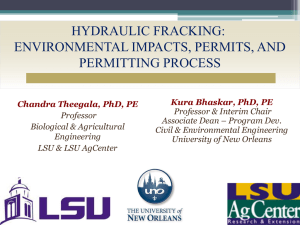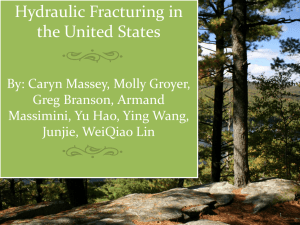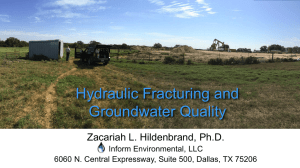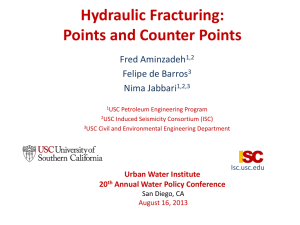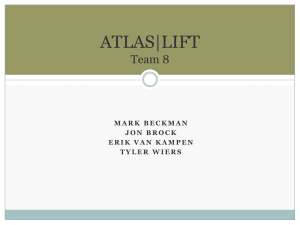Nick Ortiz - Independent Energy Producers
advertisement
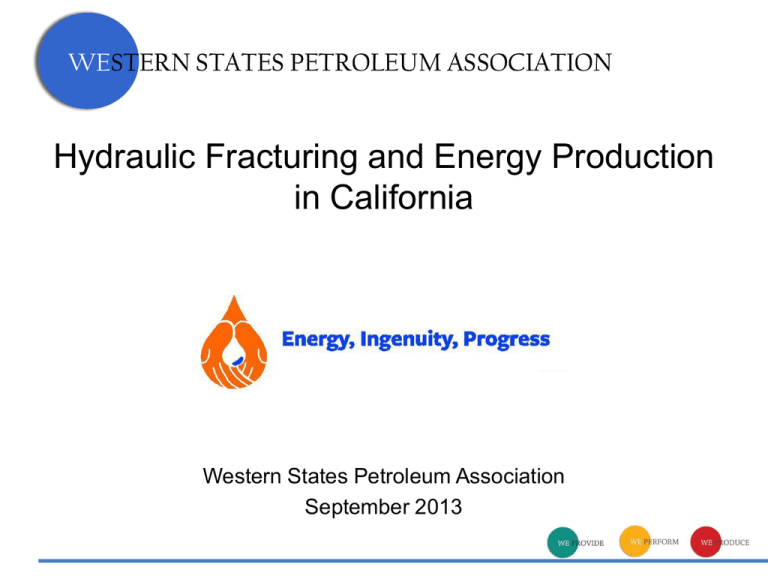
WESTERN STATES PETROLEUM ASSOCIATION Hydraulic Fracturing and Energy Production in California Western States Petroleum Association September 2013 WESTERN STATES PETROLEUM ASSOCIATION Shale Oil Resources in the United States Monterey 15.4 Billion Barrels 63% of US Shale Oil Avalon/Bone Springs 2 Billion Barrels 8% of US Shale Oil 2 Bakken 4 Billion Barrels 17% of US Shale Oil Eagle Ford 3 Billion Barrels 12% of US Shale Oil WESTERN STATES PETROLEUM ASSOCIATION An Extraordinary Opportunity “The fossil fuel deposits in California are incredible. “ Governor Jerry Brown • “The potential is extraordinary, but between now and their development lies a lot of questions that need to be answered.” Governor Jerry Brown. 3 WESTERN STATES PETROLEUM ASSOCIATION A San Joaquin Valley California Opportunity According to the EIA, 15.4 billion barrels of oil trapped in the pores of shale rocks in the San Joaquin Valley Advanced-extraction oil technology: potential in CA 1750 square mile area represents 2/3rds of U.S. shale resources 4 Hydraulic fracturing used extensively in other states and in California for 60 years without harm to the environment WESTERN STATES PETROLEUM ASSOCIATION The Monterey Shale & California’s Economic Future 512,000 Jobs by 2015 and 2.8 million by 2020 2.6% to 14.3% State GDP Increase $40.6 billion to $222.3 billion personal income increase $4.5 - $24.6 billion state and local tax revenues increase 5 WESTERN STATES PETROLEUM ASSOCIATION The Monterey Shale & the San Joaquin Valley By 2030, the Monterey Shale resource could, depending on the pace of development: Increase employment by 34,485 to 195,683 jobs Increase personal income by $4 billion to $22 billion Grow taxable sales by $1.2 billion to $6.7 billion Increase per capita GDP by $701 to $3,980 6 Source: The Petroleum Industry and Monterey Shale: Current Economic Impact and Economic Future of the San Joaquin Valley, Antonio Avalos and David Vera, Craig School of Business, California State University Fresno, August 31, 2013 WESTERN STATES PETROLEUM ASSOCIATION The Monterey Shale & San Joaquin County By 2030, the Monterey Shale resource could, depending on the pace of development: Increase employment by 5,622 to 31,904 jobs Grow taxable sales by $199 million to $1.1 billion 7 Source: The Petroleum Industry and Monterey Shale: Current Economic Impact and Economic Future of the San Joaquin Valley, Antonio Avalos and David Vera, Craig School of Business, California State University Fresno, August 31, 2013 WESTERN STATES PETROLEUM ASSOCIATION The Monterey Shale & Job Skills Training WSPA is working with CSU Bakersfield to: Assess current job skill inventory Identify job skills required by expanded oil production Create opportunities for enhance training programs 8 WESTERN STATES PETROLEUM ASSOCIATION North Dakota Fact Finding 9 WESTERN STATES PETROLEUM ASSOCIATION What is Hydraulic Fracturing Source: FracFocus, Courtesy of Texas Oil and Gas Association 10 WESTERN STATES PETROLEUM ASSOCIATION Hydraulic Fracturing: How Much, Where 568 wells fractured in 2012 according to FracFocus 2,705 well permits issued in 2012 48,970 wells currently producing oil and/or gas in CA 97 percent of hydraulic fracturing operations in 2012 were in Kern County 11 Source: WSPA survey of FracFocus website 2012 data WESTERN STATES PETROLEUM ASSOCIATION A Well Completion Process Permits are provided Well is drilled Well service company prepares well for completion Pump trucks deliver pressurized water into well, 99.5 percent of which is water and sand Fluid is collected and disposed of pursuant to permits Entire process takes 3 to 5 days Shale oil production begins 12 WESTERN STATES PETROLEUM ASSOCIATION Hydraulic Fracturing Safety Concerns All fractures separated from fresh water by at least 7,700 feet (1.5 miles) or more Studies 14 environmental issues, including public health, groundwater, air quality, seismic, noise, vibration No impacts to any of the 14 areas studies October 10, 2012 13 WESTERN STATES PETROLEUM ASSOCIATION Hydraulic Fracturing and Water Use In 2012, the average amount of water used during hydraulic fracturing operations was 116,000 gallons of water The average golf course requires 312,000 gallons per day The total amount of water used in the 568 wells that were hydraulically fractured in 2012 was 202 acre feet Farming in California 2012 uses approximately 34 million acre feet of water annually 14 WESTERN STATES PETROLEUM ASSOCIATION Hydraulic Fracturing Fluid 15 Source: Department of Energy, Ground Water Protection Council, Modern Gas Shale Development in the United States; A Primer (2009) WESTERN STATES PETROLEUM ASSOCIATION Senate Bill 4 Signed Governor Brown signed SB 4 September 20, 2014 The toughest regulations of hydraulic fracturing and other energy production activities in the country SB 4’s requirements went significantly farther than the petroleum industry felt was necessary Provides an environmental platform to responsibly develop the Monterey Shale formation A great deal of work still to be done to clarify and implement the requirements of SB 4 16 Oil industry will work with the Administration, Department of Conservation and other stakeholders to ensure SB 4 is implemented effectively and fairly WESTERN STATES PETROLEUM ASSOCIATION Hydraulic Fracturing Legislation & Regulations Stages of SB 4 Implementation By January 1, 2014 Operators must “certify” compliance with all operational, reporting, and disclosure aspects of SB 4 DOC/DOGGR working to address these issues with emergency rulemaking By January 1, 2015 Completion of a comprehensive independent scientific study on well stimulation treatments DOGGR to adopt well stimulation rules and regulations DOGGR to enter into formal agreement with other agencies to delineate regulatory authority State Water Resources Control Board to develop groundwater monitoring model criteria 17 WESTERN STATES PETROLEUM ASSOCIATION Hydraulic Fracturing Legislation & Regulations Stages of SB 4 Implementation (Continued) By July 1, 2015 DOGGR shall certify an environmental impact report (EIR) as lead agency, regarding any potential impacts of well stimulation in the state By January 1, 2016 State Water Resources Control Board shall implement regional groundwater monitoring programs DOGGR to have Internet Web site operational for operators to report specific information related to well stimulation treatment 18 WESTERN STATES PETROLEUM ASSOCIATION Kern County Regulations - CEQA EIR Development Kern County is preparing an Environmental Impact Report that provides oil producers extended CEQA coverage Oil industry is supporting and financing the process Project completion expected within 18 months Process will assist in development of a statewide EIR 19 WESTERN STATES PETROLEUM ASSOCIATION U.S. on Hydraulic Fracturing “In no case have we made a definitive determination that the fracking process has caused chemicals to enter groundwater.” U.S. Environmental Protection Agency Administrator Lisa Jackson, April 30, 2012 “I’m not aware of any proven case where the fracking process itself has affected water.” U.S. Environmental Protection Agency Administrator Lisa Jackson, May 24, 2011 “There’s a lot of hysteria that takes place now with respect to hydraulic fracking, and you see that happening in many of the states. … My point of view, based on my own study of hydraulic fracking, is that it can be done safely and has been done safely hundreds of thousands of times.” Former Secretary of the Interior Ken Salazar, February 15, 2012 20 WESTERN STATES PETROLEUM ASSOCIATION Public Support for Regulated Hydraulic Fracturing USC Dornsife/LA Times poll, June 7, 2013 Californians support hydraulic fracturing if properly regulated 41% of poll respondents said they supported hydraulic fracturing with additional regulations 19% said hydraulic fracturing was already regulated enough 30% opposed hydraulic fracturing under any circumstance 21 WESTERN STATES PETROLEUM ASSOCIATION WSPA Supports Comprehensive, Balanced Regulation Legislature needs to take a measured and responsible approach to hydraulic fracturing All parties have a responsibility to acknowledge that: There are legitimate issues related to hydraulic fracturing that must be addressed by regulators and the Legislature Production of petroleum energy is a vital and necessary part of the California economy A comprehensive regulatory package will sufficiently ensure that our state’s environmental health and natural resources are protected while safely using hydraulic fracturing technologies for energy production in California 22 WESTERN STATES PETROLEUM ASSOCIATION Thank You www.wspa.org 23
